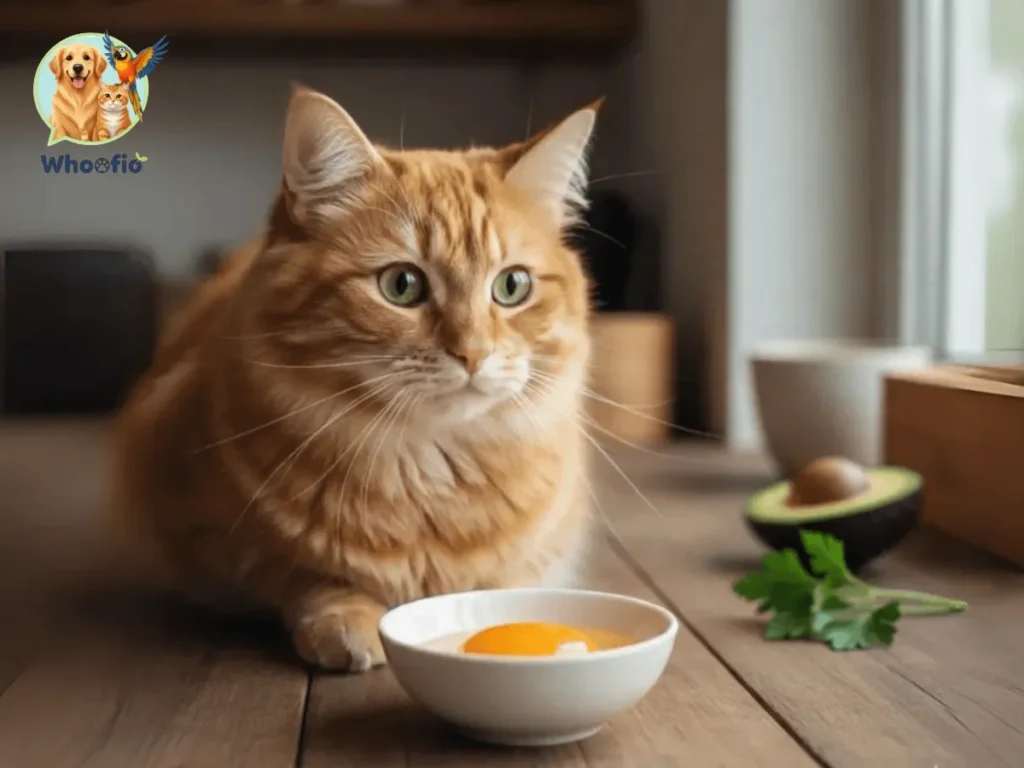When it comes to feeding your cat, one question many pet parents ask is: Can cats eat egg yolk? The short answer is yes—but only in moderation and when prepared safely.
But let’s not stop there. In this detailed guide, we’ll dive into:
- The nutritional value of egg yolks for cats
- The benefits and risks of feeding eggs
- A step-by-step guide on how to safely give eggs to your furry friend
- Alternative cat food & diet recommendations
- When you should avoid giving eggs altogether
By the end, you’ll know exactly whether an egg yolk belongs in your cat’s bowl—and how Whoofio can guide you in every aspect of your cat’s diet, grooming, pet sitting, and training.
Why Cats and Eggs Are a Common Question
Cats are obligate carnivores, meaning they thrive on animal protein. Since eggs are rich in protein, it makes sense that cat parents wonder if eggs can complement their pet’s diet.
Eggs have long been considered a superfood for humans. According to Healthline, they are packed with protein, healthy fats, vitamins, and minerals. Naturally, cat owners want to share those benefits with their pets.
But here’s the catch: while cats can safely eat cooked egg yolk, feeding raw eggs or offering them too often can lead to health risks.
Nutritional Benefits of Egg Yolk for Cats
The egg yolk is the yellow portion of the egg, and it’s loaded with nutrients. Here’s what it provides for your cat:
- Protein: Supports muscle development and overall health.
- Healthy fats: Provide energy and help keep fur shiny.
- Vitamins A, D, E, and K: Essential for immunity, bone strength, and healthy vision.
- B vitamins: Important for metabolism and nervous system health.
- Iron & selenium: Contribute to red blood cell function and antioxidant protection.
For cats, protein and fat are the most valuable parts. A small, occasional serving of cooked egg yolk can be a healthy treat.
Risks of Feeding Cats Egg Yolk
Before you rush to crack an egg, let’s go over the risks:
- Raw eggs can cause illness
Raw eggs may carry salmonella, which can make both cats and humans sick. Cooking eliminates this risk. - High in fat and cholesterol
Too much egg yolk can cause obesity or digestive upset in cats, especially if they already have weight issues. - Allergic reactions
Though rare, some cats may develop food sensitivities. Signs include vomiting, diarrhea, or itchy skin. - Not a balanced diet
Eggs should never replace your cat’s main food. They are only an occasional supplement to a complete, balanced cat diet.
Step-by-Step: How to Safely Feed Egg Yolk to Your Cat
If you want to try giving your cat egg yolk, here’s the safe way:
Step 1: Choose fresh eggs
Pick high-quality, organic eggs whenever possible.
Step 2: Cook thoroughly
Boil, scramble (without seasoning), or poach the egg. Never feed raw.
Step 3: Separate the yolk
Cats benefit from the yolk, but limit the portion size. A teaspoon is usually enough.
Step 4: Let it cool
Avoid burning your cat’s tongue—always let the egg cool before serving.
Step 5: Serve as a treat
Mix a tiny portion into your cat’s regular food, or offer it separately.
For safer treat options, explore PetMD’s cat nutrition tips.
How Often Can Cats Eat Egg Yolk?
Moderation is key. Cats can have egg yolk once or twice a week at most. Overfeeding could lead to weight gain or nutrient imbalance.
Think of egg yolk as you would a dessert for humans—it’s okay once in a while, but shouldn’t replace regular meals.
Alternatives to Egg Yolk for Cats
If you’re unsure about feeding eggs, there are plenty of safe alternatives that provide similar nutrients:
- Commercial cat treats are rich in protein
- Cooked chicken or turkey (no seasoning)
- Fish-based cat snacks for omega-3s
- Special cat food for sensitive stomachs
At Whoofio, we recommend exploring balanced pet food & diet plans tailored to your cat’s age, breed, and health needs. A professional guide ensures your cat gets the right nutrition every day.
When to Avoid Egg Yolk for Cats
Some situations call for skipping eggs altogether:
- Cats with pancreatitis or obesity: High fat content may worsen conditions.
- Kittens under 3 months: Their stomachs are more sensitive.
- Cats with food allergies: If your cat shows signs of intolerance, stop immediately.
- If your vet advises against it: Always consult your vet before adding new foods.
The Bigger Picture: Cat Diet and Care
While egg yolk can be a fun addition, your cat’s diet should focus on high-quality, species-appropriate food. A balanced approach will keep your cat healthy, active, and happy.
That’s where Whoofio steps in. With our expertise in:
- Grooming – keeping your cat’s fur shiny and mat-free
- Food & Diet – personalized nutrition guides for every stage of life
- Pet Sitting – professional care when you’re away
- Training – gentle techniques to improve behavior
…we make sure your pet’s needs are fully covered.
Final Thoughts: Can Cats Eat Egg Yolk?
So, can cats eat egg yolk? Yes, but only cooked and in small amounts. It’s nutritious, tasty, and safe as an occasional treat—but not a daily staple.
Remember:
- Always cook eggs before serving
- Stick to small portions
- Balance with a complete diet
If you want more tailored advice, Whoofio’s Food & Diet service is designed to help cat owners like you create healthy, safe, and enjoyable meal plans.
Because at the end of the day, a well-fed, well-groomed, and well-trained pet isn’t just healthier—it’s happier.

